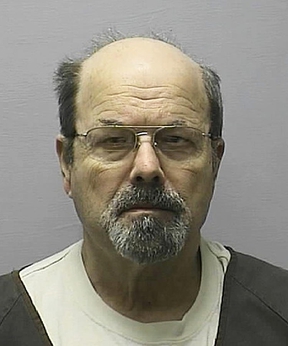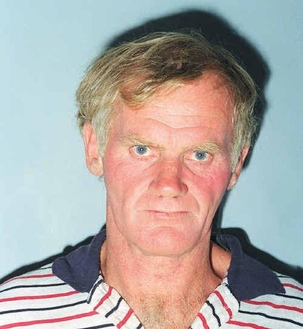Related Research Articles
Contract killing is a form of murder or assassination in which one party hires another party to kill a targeted person or people. It involves an agreement which includes some form of compensation, monetary or otherwise. It is an illegal agreement in most jurisdictions. Either party may be a person, group, or organization. Contract killing has been associated with organized crime, government conspiracies, dictatorships, and vendettas. For example, in the United States, the Italian- and Jewish-American organized crime gang Murder, Inc. committed hundreds of murders on behalf of the National Crime Syndicate during the 1930s and '40s.

Dennis Lynn Rader, also known as BTK, is an American serial killer who murdered ten people in Wichita and Park City, Kansas, between 1974 and 1991. Although Rader occasionally killed or attempted to kill men and children, he typically targeted women. His victims were often bound, sometimes with objects from their homes, and either suffocated with a plastic bag or manually strangled with a ligature.
A thrill killing is premeditated or random murder that is motivated by the sheer excitement of the act. While there have been attempts to categorize multiple murders, such as identifying "thrill killing" as a type of "hedonistic mass killing", actual details of events frequently overlap category definitions making attempts at such distinctions problematic.

The Long Bay Correctional Complex, commonly called Long Bay, is a correctional facility comprising a heritage-listed maximum and minimum security prison for males and females and a hospital to treat prisoners, psychiatric cases and remandees, located in Malabar, Sydney, New South Wales, Australia. The complex is located approximately 14 kilometres (8.7 mi) south of the Sydney CBD and is contained within a 32-hectare (79-acre) site. The facility is operated by Corrective Services New South Wales, a department administered by the Government of New South Wales.
The Snowtown murders were a series of murders committed by John Justin Bunting, Robert Joe Wagner and James Spyridon Vlassakis between August 1992 and May 1999, in and around Adelaide, South Australia. A fourth person, Mark Haydon, was convicted of helping to dispose of the bodies. The trial was one of the longest and most publicised in Australian legal history.

The Claremont serial killings is the name given by the media to a case involving the disappearance of an Australian woman, aged 18, and the killings of two others, aged 23 and 27, in 1996–1997. After attending night spots in Claremont, a wealthy western suburb of Perth, Western Australia, all three women disappeared in similar circumstances leading police to suspect that an unidentified serial killer was the offender. The case was described as the state's biggest, longest running, and most expensive investigation.
The backpacker murders were a spate of serial killings that took place in New South Wales, Australia, between 1989 and 1993, committed by Ivan Milat. The bodies of seven missing young people aged 19 to 22 were discovered partially buried in the Belanglo State Forest, 15 kilometres (9.3 mi) south-west of the New South Wales town of Berrima. Five of the victims were foreign backpackers and two were Australians from Melbourne. Milat was convicted of the murders on 27 July 1996 and was sentenced to seven consecutive life sentences, as well as 18 years without parole. He died in prison on 27 October 2019, having never confessed to the murders for which he was convicted.
A lovers' lane is a secluded area where people kiss, make out, or engage in sexual activity. These areas range from parking lots in secluded rural areas to places with extraordinary views of a cityscape or other features.
Mad dog is a phrase commonly attributed to rabid dogs.
Gleydson William MacDonald was an English serial killer responsible for the deaths of five people in the Australian states of Queensland and New South Wales between 1961 and 1962.

Leonard John Fraser, also known as The Rockhampton Rapist, was an Australian convicted serial killer.

Archie is a given name, almost exclusively masculine and a diminutive of Archibald. It may refer to:
McCafferty is a surname of Irish/Scottish origin. It is derived from the Gaelic Mac Eachmharcaigh, meaning "son of Eachmharcach". Notable people with the surname include:

Seven Murders for Scotland Yard is a 1971 Italian-Spanish giallo film directed by José Luis Madrid and starring Paul Naschy, Patricia Loran and Renzo Marignano. Naschy and Madrid wrote the screenplay, Tito Carpi's name was simply added to the credits to satisfy the requirements for a Spanish-Italian co-production. The film was shot in June 1971, and was first released in Italy in 1971 as Sette Cadaveri per Scotland Yard / Seven Corpses for Scotland Yard. It was shown in Spain on July 10, 1972 as Jack el destripador de Londres, and finally wound up theatrically released in the U.S. in 1976 as Seven Murders for Scotland Yard. The Mexican one-sheet poster simply called the film Jack el distripador/ Jack the Ripper.

Kate Bushell and Lyn Bryant were a schoolgirl and a woman murdered in separate, high-profile incidents in the West Country in 1997 and 1998 respectively. The similar circumstances of the murders led investigators to conclude that there is a high possibility the murders are linked, with both killed with knives while walking their dogs along isolated lanes within 75 miles of each other in south-west England. Bushell, only 14 years old, was found with her throat cut 300 yards from her home, with police saying the killing had been so brutal that the perpetrator may have had prior experience in slaughtering animals. Bryant was stabbed a number of times, and her killer had apparently returned to the scene four months later to place her missing glasses back at the site. The apparently motiveless killings, as well as their particularly brutal nature and apparent links, led to fears that a serial killer was at large in the south-west at the time, which were compounded by subsequent attacks on other women walking their dogs in the area. Detectives had already warned after Bushell's murder that the offender appeared to be the kind who would soon kill again, and shortly after, Bryant was murdered.
References
- ↑ Mathieson, Jack (August 7, 2012). "Serial murderer Mad Dog McCafferty helps out in partner's upmarket Edinburgh dress shop". Daily Record.
- ↑ "'Mad Dog' living in seaside resort". HeraldScotland.
- ↑ Ferguson, Anthony (January 29, 2021). Murder Down Under: Notorious Australian Serial Killers. Jefferson, North Carolina: McFarland. ISBN 9781476641515 – via Google Books.
- ↑ Schechter, Harold (2003). The Serial Killer Files: The Who, What, Where, How, and Why of the World's Most Terrifying Murderers. New York City: Random House Publishing. ISBN 9780345472007.
- ↑ The History of Australian True Crime. Arcturus. 5 July 2013. ISBN 9781782127048.
- ↑ The World Encyclopedia of Serial Killers: Volume Three, M–S. WildBlue Press. 24 November 2020. ISBN 9781952225338.
- ↑ Murder Down Under: Notorious Australian Serial Killers. McFarland. 3 February 2021. ISBN 9781476682846.
- ↑ "35 violent deaths linked to 'school for killers'". ABC News. December 13, 2011 – via www.abc.net.au.
- ↑ "Killer 'Mad Dog' McCafferty avoids jail for resetting stolen car | The Scotsman". 10 November 2008.
- ↑ "Australia to deport mass killer to UK". The Independent. March 23, 1997.
- ↑ "Triple killer beats checks to enter NZ". NZ Herald.